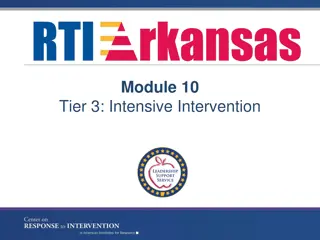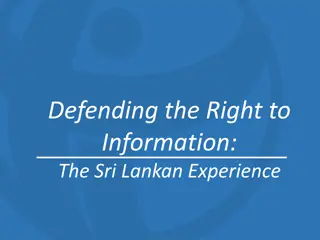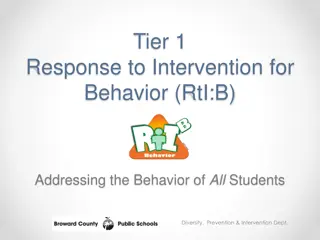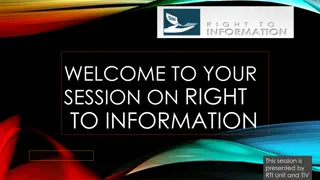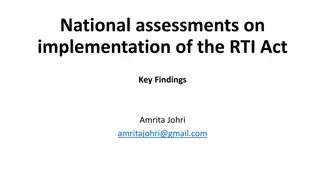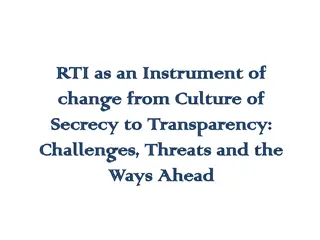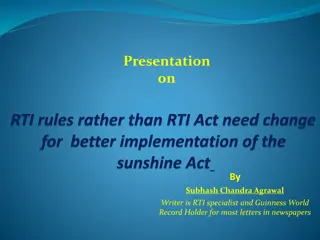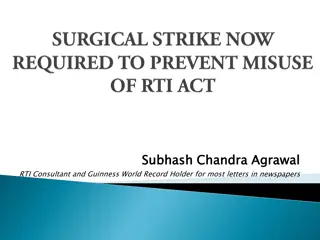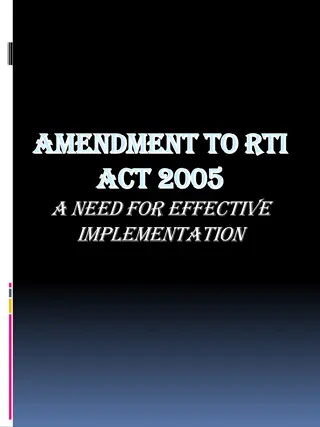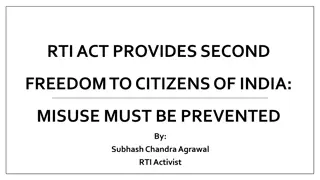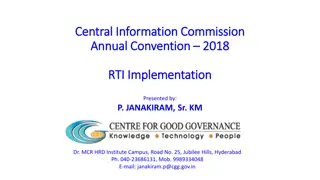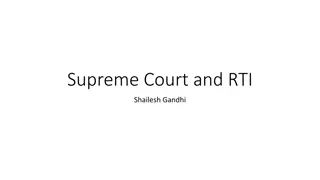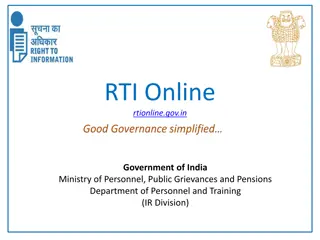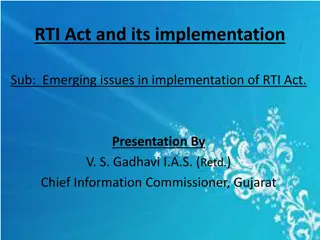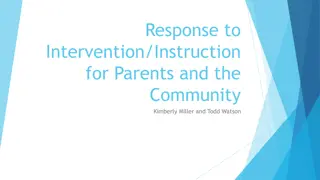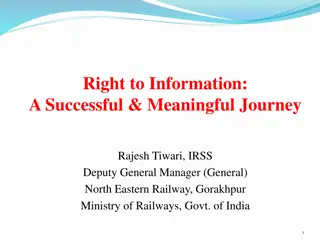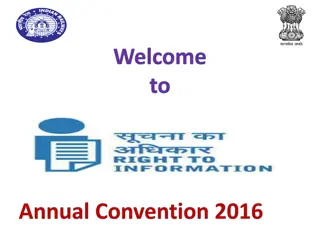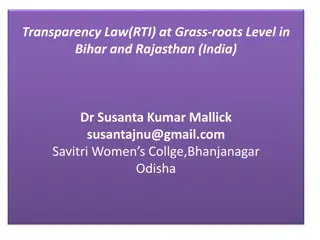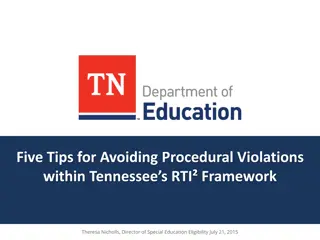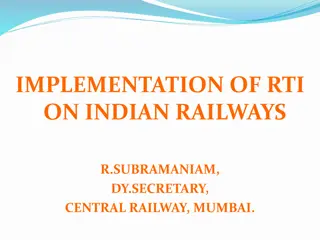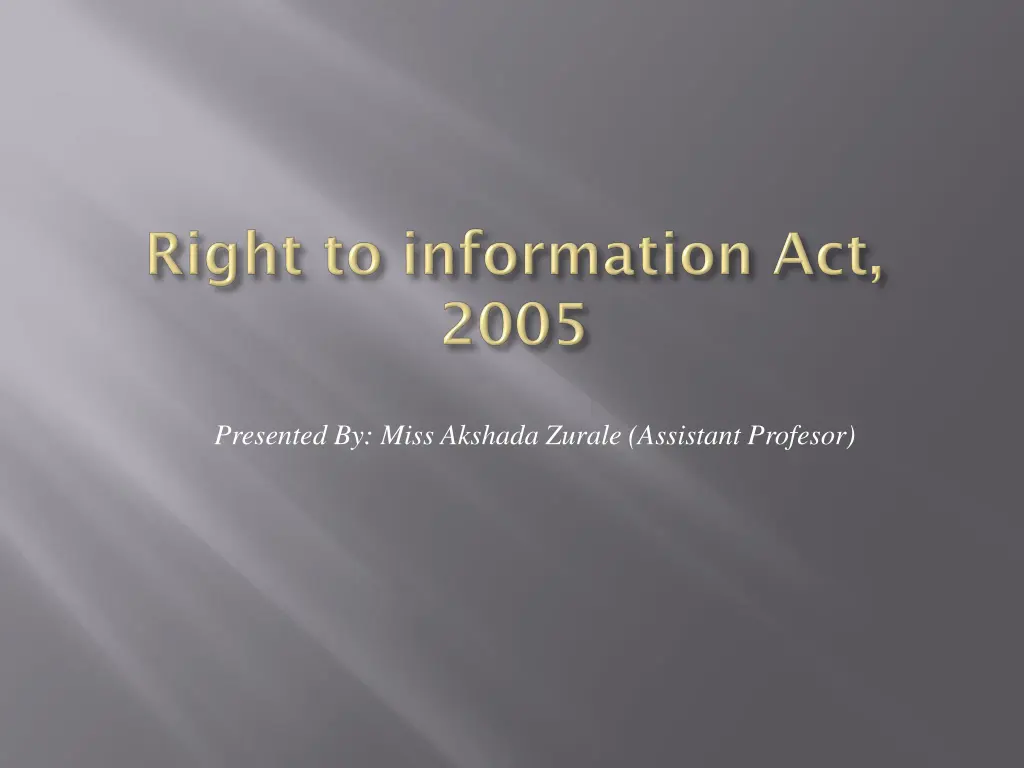
Right to Information Act in India: Empowering Citizens and Ensuring Transparency
The Right to Information Act in India is a fundamental right that empowers citizens by providing access to information held by public authorities. Enacted in 2005, the Act aims to promote transparency, accountability, and combat corruption in government operations. It enables citizens to hold the government accountable and participate effectively in governance.
Download Presentation

Please find below an Image/Link to download the presentation.
The content on the website is provided AS IS for your information and personal use only. It may not be sold, licensed, or shared on other websites without obtaining consent from the author. If you encounter any issues during the download, it is possible that the publisher has removed the file from their server.
You are allowed to download the files provided on this website for personal or commercial use, subject to the condition that they are used lawfully. All files are the property of their respective owners.
The content on the website is provided AS IS for your information and personal use only. It may not be sold, licensed, or shared on other websites without obtaining consent from the author.
E N D
Presentation Transcript
The Right to Information is a fundamental right under the Constitution of India Information is necessary to form and express opinions, dissent or support on any matter. It is therefore a part of Article 19(1)(a) Information is necessary for protection of the right to life and liberty. It is therefore a part of Article 21
An Act to provide for setting out the practical regimeof right to information for citizens to secure access to information under the control of public authorities, in order to promote transparency and accountability in the working of every public authority, the constitution of a Central Information Commission and State Information Commissions and for matters connected therewith or incidental thereto.
Under the provisions of the Act, any citizen may request information from a "public authority" which is requiredto reply expeditiously or within 30 days. The Act also requires every public authority to computerize their records for wide dissemination and to proactivelycertain categories of information so that the citizens need minimum recourse to request for information formally. Section 2 (f) of the act defines information as Information means any material in any form including records, documents, memos, e-mails, opinions, advices, press releases, circulars, orders, logbooks, contracts, reports, papers, samples, models, data material held in any electronic form and information relating to any private body which can be accessed by apublic authority under any other law for the time being in force but does not include "file noting .
RTI Act is a progressive legislation based on citizens rightto know which is a fundamental right enshrined in the Constitution of India. The purpose of the act is to make the executive accountable and ensure transparency in the implementation of schemesand policies. Under the act, information may be sought from a public authority as defined under the act. Right to information includes right to inspect documents. It came into force on 12th October 2005 (120th day of its enactment on 15th June, 2005).
The basic object of the Right to Information Act isto empower the citizens, promote transparency and accountability in the working of the Government. Another objective is to contain corruption, and make our democracy work for the people in real sense. It goes without saying that an informed citizen is better equipped to keep necessary vigil on the instruments of governance and make the government more accountable to the governed. The Act is a big step towards making thecitizens informed about the activities of the Government.
All citizens possess the right to information. Information can be obtained within 30 days from the date of request in a normal case. If information is a matter of life or liberty of a person, it can be obtained within 48 hours from time of request. Every public authority is under obligation to provide information on written request or request by electronic means. Certain information are prohibited. Restrictions made for third party information. Appeal against the decision of the Central Information Commission or State Information Commission can be made to an officer who is senior in rank.
Penalty for refusal to receive an application for information or for not providing information is Rs.250/- per day but the total amount of penalty should not exceed Rs.25,000/-. Central Information Commission and State Information Commission are to be constituted by the Central Government and the respective State Governments. No Court can entertain any suit, application or other proceedings in respect of any order made under the Act.
Public authorities : Constitutional Bodies Statutory Bodies Public Corporations Public Undertakings NGO s (receiving financial assistance)
Maintain records catalogued and indexed->computerization, networking Publish certain particulars within 120 days Publish relevant facts while formulating policies/decisions affecting public Provide reasons for administrative/ quasi-judicial decisionsto affected persons Suo moto provide information ->minimize need for resorting to RTI Form of dissemination- easily accessible In 100 days, designate PIOs andAPIOs Info should be free or at cost of medium only
Public Information Officers (PIOs) are officers designated by the public authorities in all administrative units or offices under it to provide information to the citizens requesting for information under the Act. these have designated some of its officers as Public Information Officer. They are responsible to give information to a person who seeks information under the RTI Act
Deal with requests for information Offer reasonable assistance to applicant Provide access-enabling assistance to sensorily disabled Seek assistance from any other officer as considered necessary For the purpose of contravention of this act, such other officer will be treated as PIO.
Will be made to PIO To be in writing/ electronic means In Hindi, English, Official language of the area Accompanied by prescribed fee No reason required No personal details required except for contacting To be transferred to another public authority if pertains to them (in 5 days) informed applicant to be
Sovereignty and Integrity of the Nation. Security of the state. 18 institute (CBI, RAW,etc.) Right to privacy. Trade secret/ Commercial info./ Seal Tender info. Etc. Information from a foreign govt. Cabinet papers including records of deliberations of the Council of Ministers, Secretaries or prosecution of offenders Information which has been expressly forbidden to be published by any court of law
IB, Directorate General of Income tax(Investigation), RAW, IB, CBI, Directorate of Revenue Intelligence, Central Economic, Directorate of Enforcement, Narcotics Control Bureau, Aviation ResearchCentre, Special Frontier Force, BSF, CRPF, ITBP, CISF, NSG, Assam Rifles, Special Service Bureau, Special Branch (CID), Andaman and Nicobar, The Crime Branch-CID-CB, Dadra and Nagar Haveli and Special Branch, Lakshadweep Police. Agencies specified by the State Governments through a Notification will also be excluded.
An autonomous body to inquire into complaints received from citizens. One can complain to the CIC if refused access to information or how the public authority has handled your requested, for instance: Failure to respond to your request within 30 working days or failure to explain why an extension is needed.
Failure to give you proper advice and help within the stipulated time. Failure to give information in the form in which you asked for it. Failure to properly explain reasons for refusing your request, for instance if the public authority believes that giving you information would harm a criminal investigations.
Central Information Commission is constituted by the Central Government through a Gazette Notification. The Commission includes one Chief Information Commissioner (CIC) and not more than 10 Information Commissioners (IC) who will be appointed by the President of India. The Central Information Commission/State Information Commission has a duty to receive complaints from any person.
CIC will have a power of a civil court The State Information Commission will be constituted by the State Government through a Gazette notification. It will have one State Chief Information Commissioner (SCIC) and not more than 10 State Information Commissioners (SIC) to be appointed by the Governor.
Information commissioner can panelize PIO (Public Information Officer) Rs. 250 to maximum Rs. 25,000

